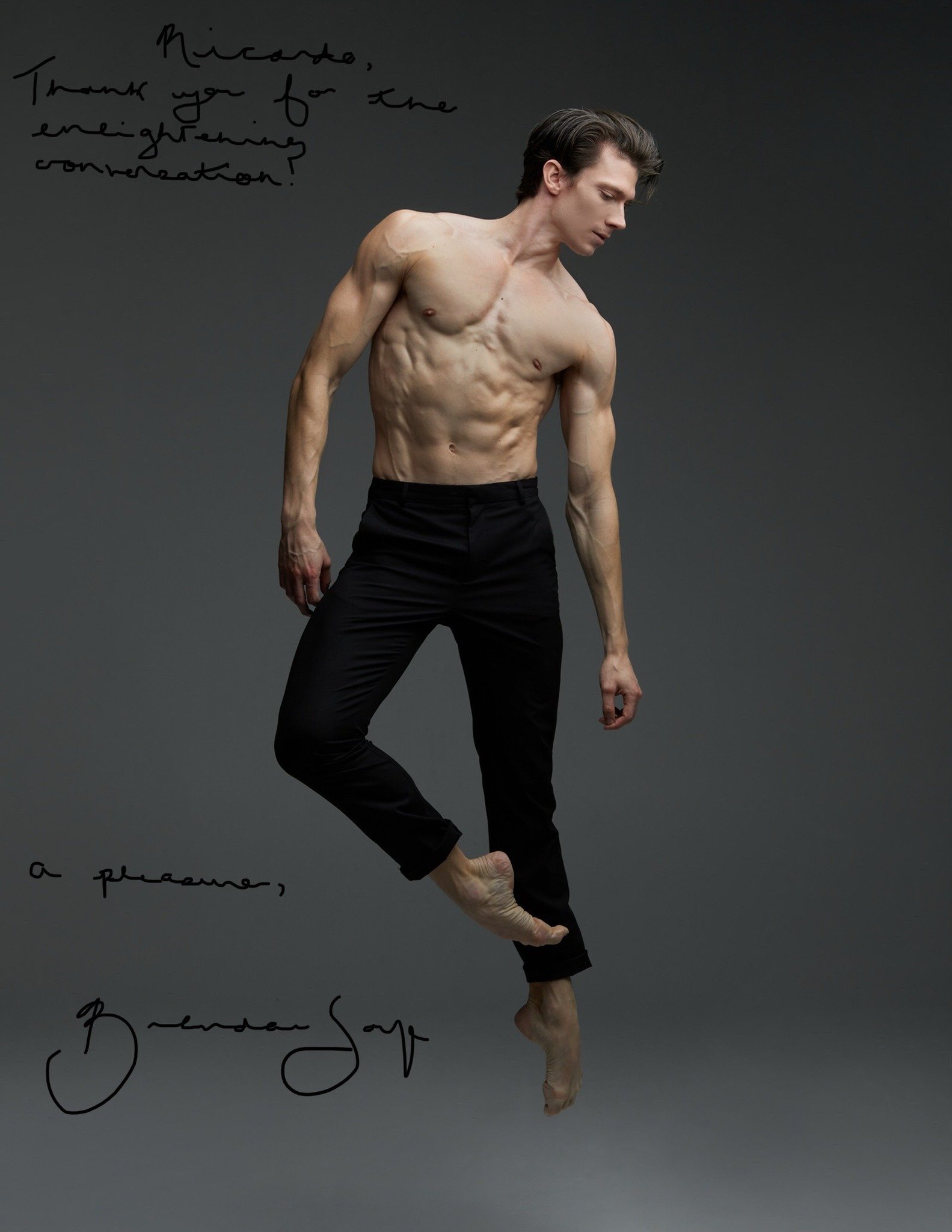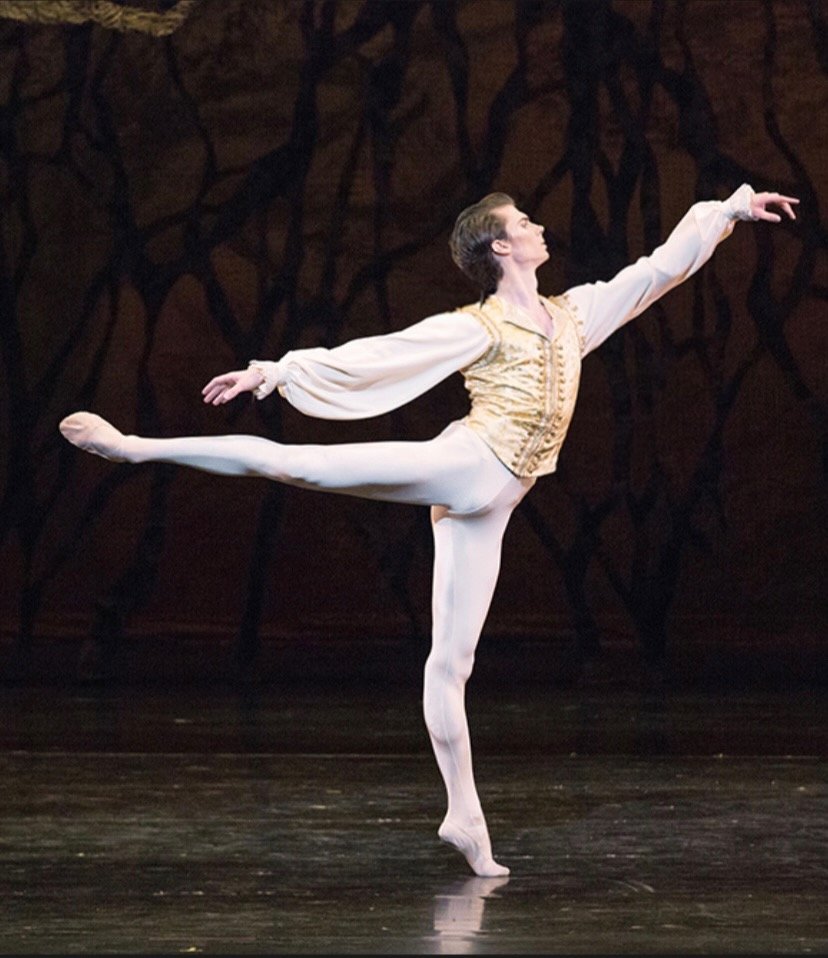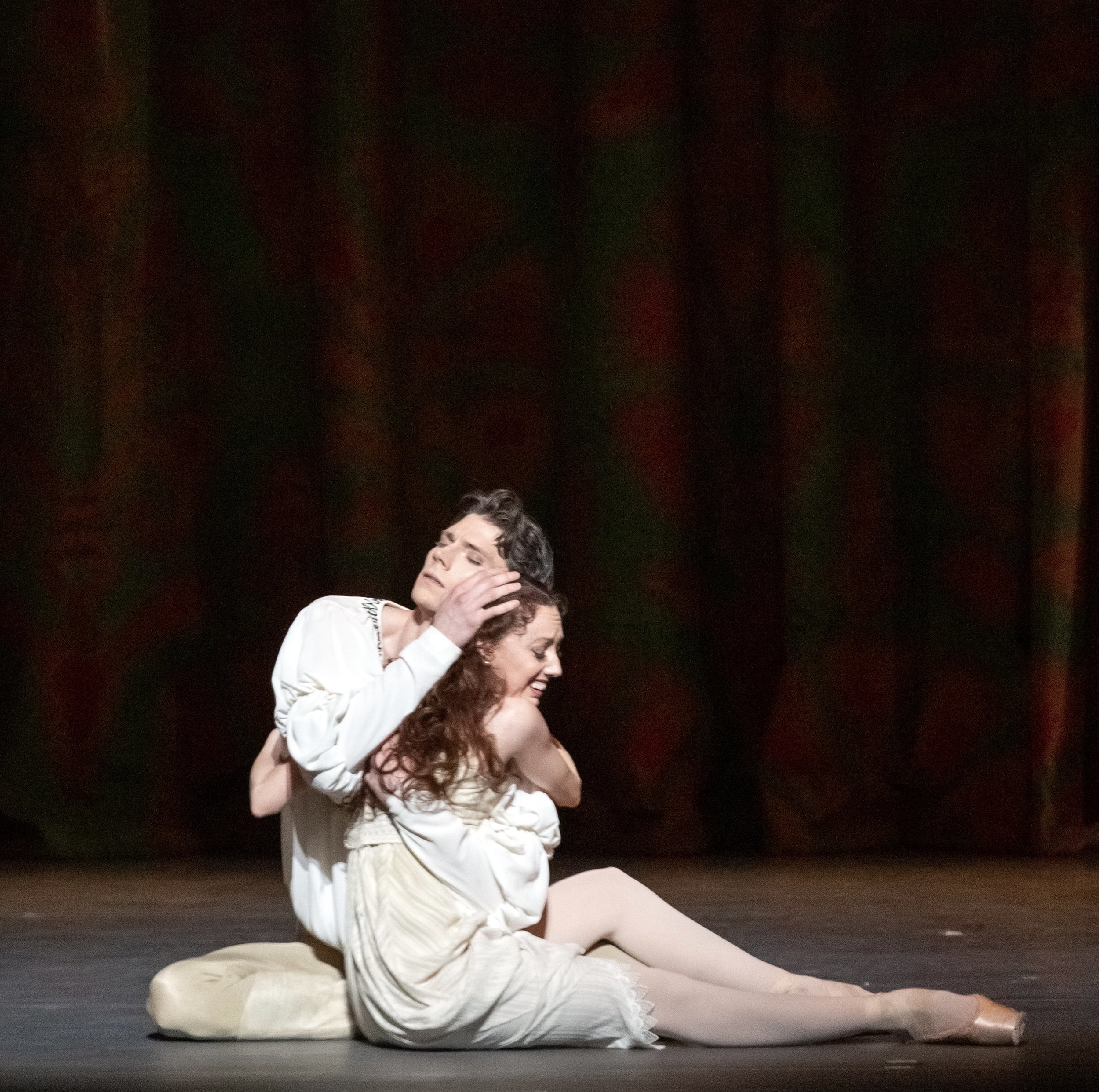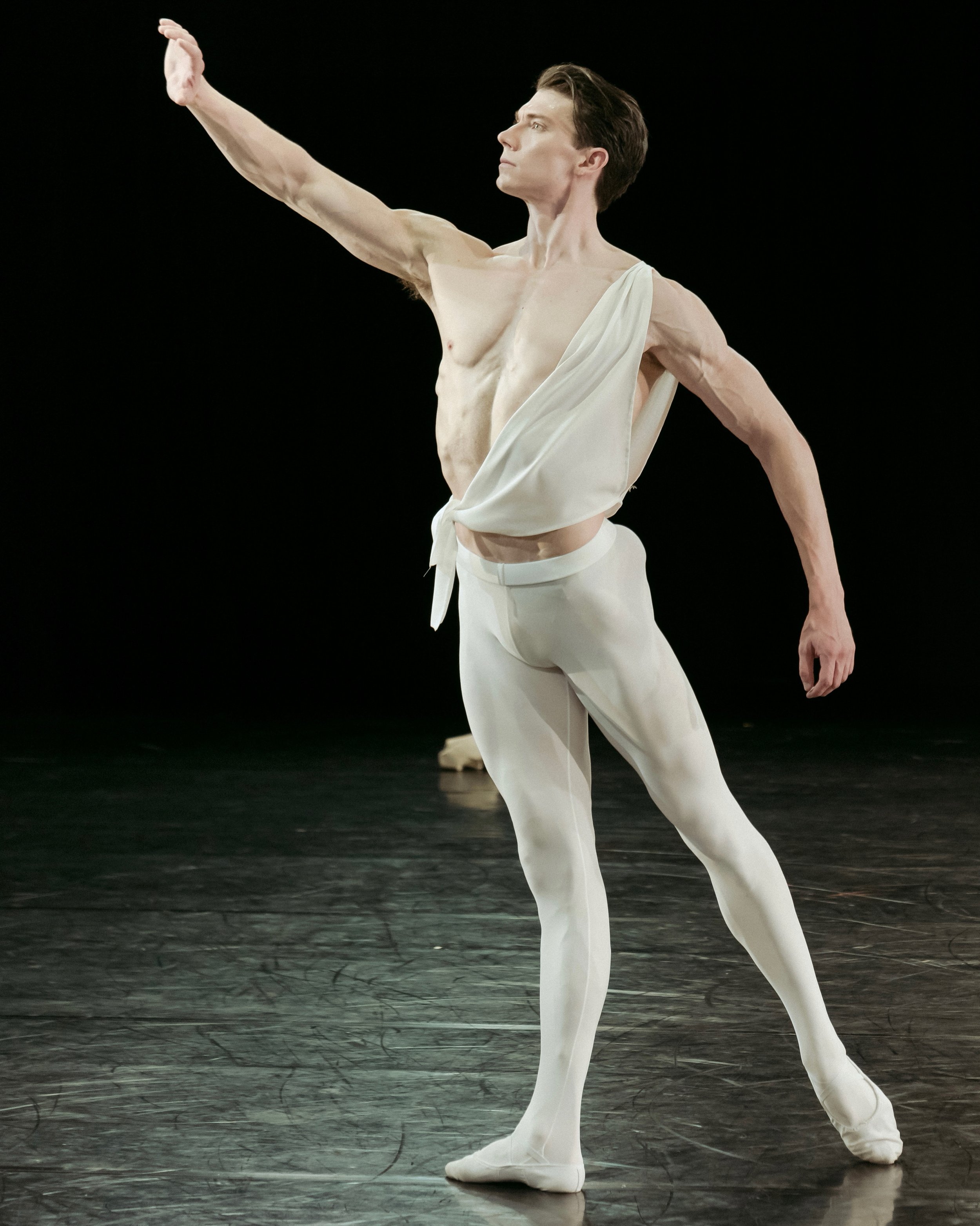Brendan Saye, principal (National Ballet of Canada, Vienna State Ballet/Wiener Staatsballett): an Interview, Nov. 23rd, 2022 (Part 1)
Before starting, I must remind you of a brilliant speech that Meryl Streep made during The 2017 Golden Globe Awards. It was directed at Mr Trump and his politics that were openly against the press, Hollywood, and its „foreigners". After mentioning quite a few nominees, who were born outside the U.S.A., she mentioned Ryan Gosling, the brilliant actor, and simply said: „Ryan Gosling, like all nicest people, is Canadian". I can only underline this statement when referring to Mr Saye. I like to use this „image of speech" to give you a picture of this interview, its mood, and the synergy that took place between us.
It was a rainy, cold Autumn afternoon when I entered a favourite Café of mine in Vienna's inner city. Although Mr Saye and I had been in contact, planning this meeting for our Interview, for a long time (we wanted to find a date for after the last Première at the State Opera) we had never neither met nor seen each other before. He was sitting at the back of the room and when he saw me coming, he stood up and greeted me so warmly as if we had known each other our whole lives. He is quite a tall dancer and I had the feeling that he would never „finish" standing up! Immediately the coldness and discomfort of that terrible weather left me and I felt warm. Yes, this was surely going to be a relaxed interview. And that is always good. Nothing can be as amusing and informative as an informal chat.
We started talking about Canada, the National Ballet of Canada and its repertoire, and mutual friends... This normal, instinctive, and pleasurable procedure was nothing else than getting to know each other before starting the interview (Or, as I say, practicing a bit of the „Little Prince's getting to know the Fox syndrome! Bit by bit!). We knew we had nearly three hours until he'd have to get back to rehearsals and we felt relaxed, warm, and with the gift of having enough time. Enough time. At least we thought so.
I consider Mr Saye´s move to Vienna a great gain for the Ballet scene in this city. I have followed his career for some time and was extremely impressed by his „reading" of Apollo – but I don´t want to go ahead with my story, you would not like that. Even if I do not quite understand his motives for joining the Vienna State Ballet – a company whose classical repertoire has been brought to a minimum after Manuel Legris's departure to Milano - Note: I always considered the Vienna State Ballet a strong repertoire company – luckily for us, this city is always filled with tourists (except for the last Lockdown which coincided with the beginning period of the present direction and during which nobody expected a good seat occupancy at the Opera – now the situation has changed!), who want to, when back home, tell their friends that they have seen either „Swan Lake" or „Giselle" or „The Nutcracker" etc. This was taken into account by the last directors while planning the Seasons in advance. This year, there is a single performance of „Don Quixote" and that won´t do very much for the occupancy of a House that is paid with Tax money and that should at least get even financially by the end of a Season. But this is another subject, which we'll „discuss" some other time.
„Dear Brendan, first of all, thank you for taking your time for this „talk". Let us start at "the very beginning", OK? You were born in Vancouver and went to Canada's National Ballet School. When did you join the company?"
He smiles calmly, in a very relaxed way, as he says „Well, it was 2008. I was promoted to a Principal Dancer in 2019, after having been dancing principal parts for quite some time "
Copyright: National Ballet of Canada / Karolina Kuras
„That brings me to an important question (I mean „important" because they may be helpful for younger dancers). Having researched a bit about your „repertoire", I was quite impressed by the different roles you have danced. Something that not only reveals much about your versatility but is also a testimony that „The National Ballet" does not typecast its dancers… How is, generally, your creative process while rehearsing a new role? And, is this extreme use of technology helpful or not?"
He ponders for a second or two as if going inside himself „Ricardo… I guess I know where you want to get to and I agree", he laughs „Technology, all this vast information. It is something wonderful and helps to educate oneself if used intelligently in the right way. But this muddle, even the hassle of information can be quite confusing too. People tend to copy what they just watched instead of following instinctively what they were thinking and feeling in the first place. In my case, being very selective and loving Ballet history, I concentrate on a few performers and their unique approaches in certain moments of the choreographic work I´m researching! Well, times change: when I was a kid, exactly during those years when the information you get nowadays on the net was still being „built", I spent long hours at my School Library", he says and it is obvious that he is somehow „going down memory lane". Yes, times change, and how quickly the approach to information has changed during the past 15, 20 years.
Even while he is talking about times that he refers to as „When I was a kid", I realize all of a sudden that I am sitting not only with a bright man but with a bright young man. I become fascinated by the fact that he creates characters on stage that belong to another age range, in full contrast to his own persona, although these characters are also a part of him... Are you being able to follow me at all?) You can distinctly feel this in his Apollo and how subtly he changes as he ages. This is an illusion. An illusion created by Artistry. And, I must add, a very difficult one for it uses lots of his own personality – somebody once said (who?), that the hardest illusion to create on a stage is being oneself? I must add to this thought that the fact that Mr Saye, due to his fine features, has what could be called chameleon looks, always changing. Does anyone remember Veruschka? That's it! The magic of Artistry... This fascinating „transformation" (It borders Magic, the one that Artistry is responsible for!) that is becoming so rare.
Yes, a mysterious, inexplicable phenomenon…
Copyright: National Ballet of Canada / Karolina Kuras
„From technology to technique: How do you see this exaggerated technique issue today?"
He smiles broadly and says „I was never a „technician". I work a lot on quality and on the character's motives and therefore on his profile. From my own experience as a young dancer I can only say that exactly the performances that hung on my mind were the ones that came from people who never turned more than a few pirouettes", he laughs „I don´t want to disregard the ones that can turn and jump like athletes but I have massive respect towards people with more than that. And I call it „substance", Yes, Artistry at its very best. You can plainly see that they have studied the roles carefully, understand them completely, feel them thoroughly – and that is the secret why audiences can relate to them in full understanding of the character, the piece they are dancing"
This makes me remember the talk I witnessed at the Opera, during a Première's intermission. Due to several reasons a much more „ballet educated", the knowledgeable public has been avoiding the Opera, therefore a new „public" is discovering it (this is just because of the huge discounts, even for Premières that have been given during the last months to achieve at least a certain occupancy rate without „making it even", as I have mentioned before). This „new public", who just recently joined the Opera, is the one that shouts „Bravo" and gives a standing ovation for anything that has appeared on stage, without any sense of quality for lack of comparison possibilities. This same „Première public", which surprisingly includes many Germans (I guess, by their Low German Dialects that they come mostly from North Rhine Westphalia and the so-called „Ruhrpott"), is the one that applauds and shouts when a dancer turns (many) pirouettes, when an Odile turns 32 double fouettès, and when the male dancer does a Manége. In short, a public that just cherishes dance for its „circus-like" side. Not the public who can understand the Nobility, precise use of his lines, stage presence, and character readings that are Mr Saye´s qualities, very natural aptitudes. His „registered mark", so to say. It is obvious that this less informed public will need a while until they can recognize and cherish talent, „Noblesse" and „Finesse " like Mr Saye's.
Copyright: National Ballet of Canada / Karolina Kuras
„Now I need a quick answer, quite spontaneously... Please, tell me about three of your favourite roles!", I add, also quite spontaneously. I am curious. Especially thinking of his reserved, elegant attitude on stage. The same reserved way that you have experienced very seldon and, pardon me the comparison, was one of Erik Brunn's and Michael Dennard`s greatest gifts – one that is at the same time incredibly concrete (and therefore easy to identify with) and mysterious – because it fills us with curiosity, asking for more...
It is obvious that he does not have to figure it out „To start with „Apollo", it was a unique experience to recreate this role. I felt so utterly confident while performing it. I was not imitating anyone – even though there were so many wonderful dancers in the part!", he says.
Even not wanting to interrupt him to get the most spontaneous answer possible for the „three roles", I had to „Yes, and that is exactly how I felt while watching you recreate it. It was your OWN reading of the character. There were some dramatic moments as I have never seen them before. For me, nearly heart-breaking, filled with so much substance – to use a substantive that you have just used today! Sorry for interrupting!", I add.
Copyright: National Ballet of Canada / Karolina Kuras
„Where was I? Yes, Apollo and then Oberon in „The Dream", even if many people are surprised by that. I was extremely nervous when I was cast – Ashton… and you can imagine the responsibility and difficulty to dance anything that was created on Anthony Dowell!"
„I can imagine that very well", I say with a deep sigh.
Copyright: National Ballet of Canada / Karolina Kuras
„And another favourite: “The man” in „Four Seasons" by James Kudelka. This fascinating metaphor is the use of the four Seasons to represent four „seasons" of his life, with four women”
I think of Kudelka, and his fascinating, sensitive work. I was introduced to it while watching „Cruel World" (with Julie Kent & Robert Hill), one of the most „touchy" pas de deux, I have ever seen. A display of what vulnerability mixed with willpower can be: Why is James Kudelka's work so overseen in Europe?
„Is there or are there any roles which you would not like to dance anymore?", I ask provokingly.
„It feels difficult to answer that without potentially offending someone (either a choreographer or a coach or director). Do you think we could omit that one?", he says, while looking directly and earnestly at me. I can feel that this is an important issue for him.
„We sure can. And, I must say, how I admire and respect your elegant attitude", I must honestly add. This answer revealed much more than intended: This Attitude, Elegance, and Noblesse of character, not wanting to offend anyone, reveals much more than it seems in the first place. He is not only a Danseur Noble onstage. He is also one when out of it. Yes, I think, the pieces of the puzzle are getting together. Much quicker than I thought.
Copyright: National Ballet of Canada / Karolina Kuras
To be continued on March 13th.












